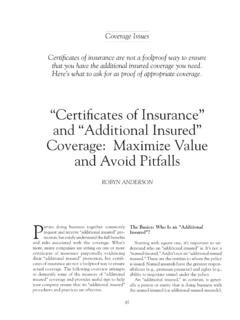Transcription of Why Request a Certificate of Insurance from a Vendor
1 Why Request a Certificate of Insurance from a Vendor What is a Certificate of Insurance ? A Certificate of Insurance is a document issued by the Insurance agent on behalf of an Insurance company to a third party who has not contracted with the Insurance company to purchase an Insurance policy. The most common type of Certificate is that provided for informational purposes to advise the third party of the existence and amount of Insurance issued to the named insured . Certificates do not alter the coverage of the policy. They simply provide a snapshot of the named insured 's coverage at the time of the Certificate . Informational certificates are usually issued in conjunction with a contractual relationship between a third party and the named insured , requiring that the named insured have a particular amount and type of Insurance .
2 It is very common for a third party to Request a Certificate showing the named insured 's coverage and term of Insurance for liability and workers compensation. It is not wise to have a company or person work for you unless you know they have liability and workers compensation Insurance . When the company doing the work is uninsured or under- insured , the third party becomes the deep pocket.. Why ask for Certificates of Insurance from Vendors? Long term care facilities of all skill levels of care, from independent living to skilled care facilities, have independent contractors coming into the facility who provide services to the residents.
3 The services could include PT, OT, ST, wound care, pharmacy, dietary consultant, lab, mobile x-ray, home health agency and many others. There may be a contract between the facility and the independent contractor or it could be a contract between the resident and the independent contractor. Whether there is a contract or not, the independent contractor is coming into the facility to provided the service. The service is normally provided with limited or no involvement from facility personnel. We live in a very litigious society. An incident resulting from an independent contractor's work could result in a liability claim from an injured resident or the family.
4 Plaintiff attorneys usually look for more than one party to sue. Since an incident occurred in a facility where a resident was treated, the facility may also be named in the suit. This could happen even though no contract exits between the independent contractor and the facility. The resident or family holds the facility responsible for the care provided. Therefore, it is wise to at least know whether any independent contractor providing care or treatment to a resident has liability Insurance of their own with adequate limits. Is there more a Facility can do to protect itself? The facility can require each independent contractor treating a resident or providing a service on a regular basis to add the facility as an additional insured on the independent contractor's liability policy.
5 There is little or no cost to the policyholder. With the additional insured status the facility is protected by the independent contractor's policy first if the incident that results in a claim occurred through the actions of the independent contractor or its employees. The additional insured status shifts the duty to provide defense and the cost of a settlement to the independent contractor's insurer before the facility's liability policy is affected. This continues until the claim costs exceed the limits of the additional insured 's policy. The examples are numerous of incidents where the additional insured status will benefit the facility.
6 Requiring the vendors treating residents in the facility to provide additional insured status to the facility for general and professional liability is an excellent business practice. A pending system to be sure the additional insured status is maintained by the Vendor should be implemented also. The minimum action is to require an independent contractor to provide a Certificate of Insurance before they provide service to any resident of the facility. If you have questions, call Scott or Jack at Voss Insurance Services to discuss your situation.






